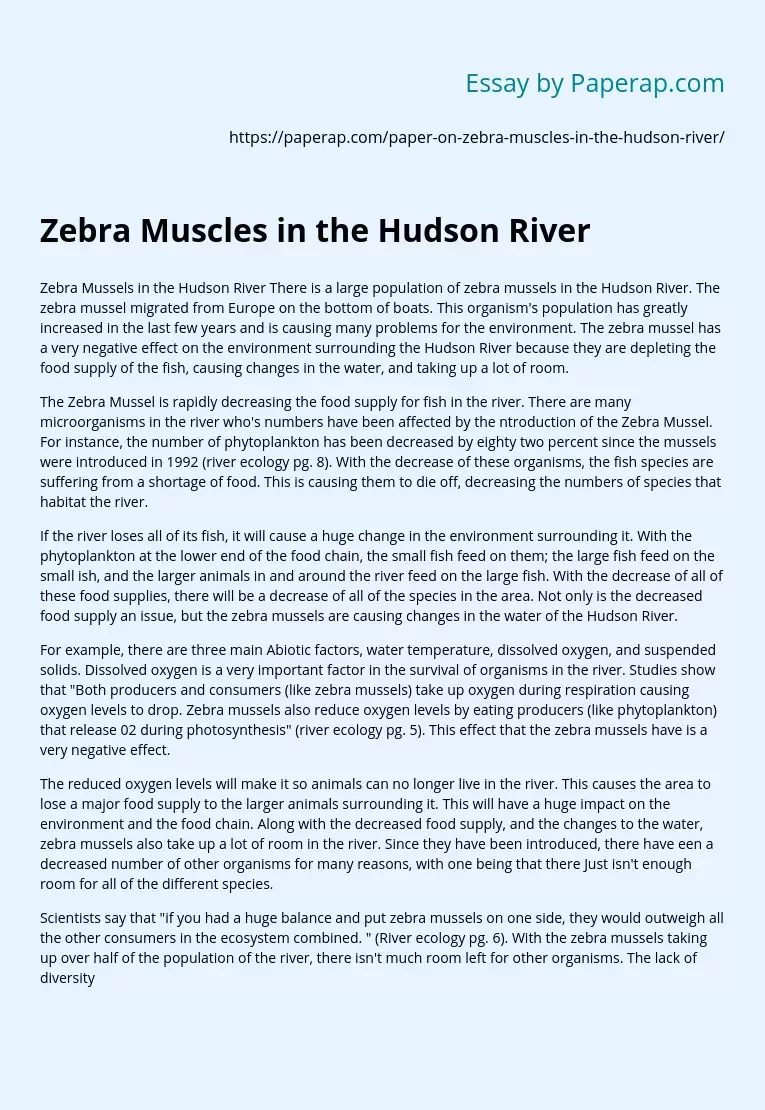Zebra Muscles in the Hudson River
Zebra Mussels in the Hudson River There is a large population of zebra mussels in the Hudson River. The zebra mussel migrated from Europe on the bottom of boats. This organism’s population has greatly increased in the last few years and is causing many problems for the environment. The zebra mussel has a very negative effect on the environment surrounding the Hudson River because they are depleting the food supply of the fish, causing changes in the water, and taking up a lot of room.
The Zebra Mussel is rapidly decreasing the food supply for fish in the river. There are many microorganisms in the river who’s numbers have been affected by the ntroduction of the Zebra Mussel. For instance, the number of phytoplankton has been decreased by eighty two percent since the mussels were introduced in 1992 (river ecology pg. 8). With the decrease of these organisms, the fish species are suffering from a shortage of food. This is causing them to die off, decreasing the numbers of species that habitat the river.
If the river loses all of its fish, it will cause a huge change in the environment surrounding it. With the phytoplankton at the lower end of the food chain, the small fish feed on them; the large fish feed on the small ish, and the larger animals in and around the river feed on the large fish. With the decrease of all of these food supplies, there will be a decrease of all of the species in the area.
Not only is the decreased food supply an issue, but the zebra mussels are causing changes in the water of the Hudson River.
For example, there are three main Abiotic factors, water temperature, dissolved oxygen, and suspended solids. Dissolved oxygen is a very important factor in the survival of organisms in the river. Studies show that “Both producers and consumers (like zebra mussels) take up oxygen during respiration causing oxygen levels to drop. Zebra mussels also reduce oxygen levels by eating producers (like phytoplankton) that release 02 during photosynthesis” (river ecology pg. 5). This effect that the zebra mussels have is a very negative effect.
The reduced oxygen levels will make it so animals can no longer live in the river. This causes the area to lose a major food supply to the larger animals surrounding it. This will have a huge impact on the environment and the food chain. Along with the decreased food supply, and the changes to the water, zebra mussels also take up a lot of room in the river. Since they have been introduced, there have een a decreased number of other organisms for many reasons, with one being that there Just isn’t enough room for all of the different species.
Scientists say that “if you had a huge balance and put zebra mussels on one side, they would outweigh all the other consumers in the ecosystem combined. ” (River ecology pg. 6). With the zebra mussels taking up over half of the population of the river, there isn’t much room left for other organisms. The lack of diversity in the river is a huge problem to the food chain, because once a species no longer exists, it is hard for larger animals to find a ew supply of food.
This again will cause a decrease in surrounding animals, and could even cause some animals to become extinct. In conclusion, the zebra mussel has a very negative effect on the environment surrounding the Hudson River because taking up a lot of room. If the number of zebra mussels isn’t decreased, the Hudson River could be facing a huge problem. It is slowly losing its specie variety, the 02 levels are decreasing, and the river is being filled with more and more of this organism. If this isn’t controlled, this area could have a large problem on their hands in the near future.
Zebra Muscles in the Hudson River. (2018, Jul 16). Retrieved from https://paperap.com/paper-on-zebra-muscles-in-the-hudson-river/

